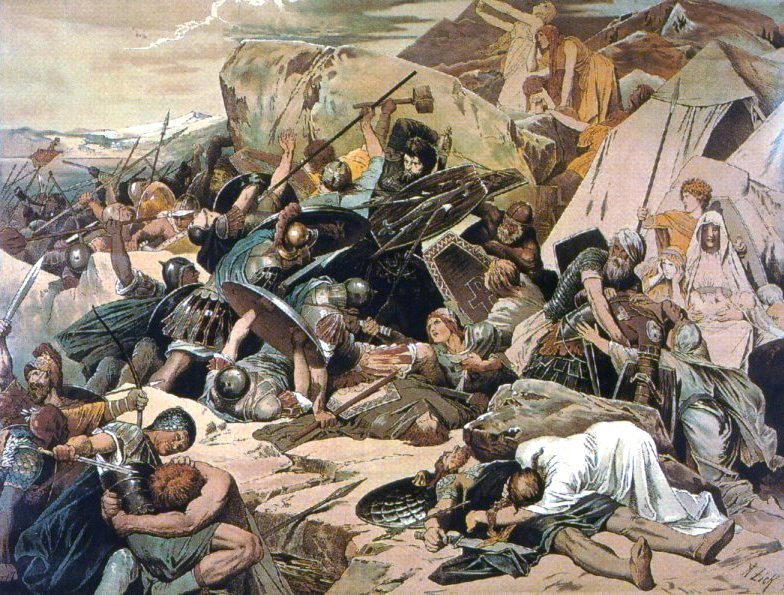Of Chris Trotter, Emperor Justinian, and Historical Pedantry

Venerable New Zealand political commentator, Chris Trotter (https://bowalleyroad.blogspot.com/), is a sad creature these days. Once one of the most reliable Leftist writers out there – Economic Left at that – Trotter seems to have absorbed the worldview of Auckland culture-war obsessives. It is not for me to categorise what he has become, though I would note he still has this on his home page, as if in memory of better times:
If the blog seems in danger of being over-run by the usual far-Right suspects, I reserve the right to simply disable the Comments function, and will keep it that way until the perpetrators find somewhere more appropriate to vent their collective spleen.
Trotter now has his comments section regularly overrun with Far-Right conspiracy theorists, of all flavours. And he does nothing about it. Oh dear.
But that is neither here nor there. No, my issue with Trotter today is a certain recent piece, whereby he laments the historical illiteracy of contemporary New Zealand politicians:
https://bowalleyroad.blogspot.com/2024/03/misremembering-justinians-taxes.html
(I actually submitted a corrective comment over there myself, but that seems to have been filtered out. Hence writing my own corrective blog post on A Phuulish Fellow).
Trotter cites Barbara Edmonds, Labour’s Finance Spokesman, as saying the following during a television interview:
When I was going through Law School, I was also doing some ancient history papers. And, basically, Emperor Justinian. It was the fall of the Roman Empire because, basically, they had to over-tax people to pay for the war and for the [indistinct]. So, the lesson I learned from that was that if you over-tax people, well, in Justinian’s case, it broke down an empire.
Edmonds is clearly misremembering – we shall get to that – but Trotter offers his own commentary, as follows:
The Emperor Justinian ruled over the Eastern Roman Empire – better known to history as the Byzantine Empire – from 527-565 AD. Far from presiding over the fall of the Roman Empire, Justinian and his generals recovered many of the Western Empire’s lost provinces – an achievement which dramatically boosted Byzantine tax revenues. Justinian used this surplus income to construct the extraordinary Christian basilica of Hagia Sophia. This, the Emperor’s most tangible legacy, still stands in the heart of Istanbul (converted, now, to a mosque). Justinian’s other great legacy, known as the Justinian Code, still serves as the foundation of Europe’s legal system. The Byzantine Empire did fall – but not for almost another thousand years. Its mighty walled capital, Constantinople, was besieged and conquered by the Ottoman Turks in 1453.
To my mind, it is one thing for a politician on television to misremember her university History classes. It is another for a well-read commentator like Trotter to pillory said politician, while managing to get his own version of historical events wrong – or at least misleading – in the process.

You see, Justinian inherited a treasury flowing with gold. Old Anastasius I had seen to that (https://en.wikipedia.org/wiki/Anastasius_I_Dicorus). Justinian’s attempted Roman Reconquest did not bring in surplus cash to fund the Hagia Sophia – rather, his subsequent wars proved hideously expensive in terms of both blood and treasure, and Justinian was not the sort to wait to reincorporate North Africa before rushing onto his Italian adventure. Justinian inherited cash and he spent cash. Hand over fist – the man was a mad visionary.
Justinian could not control the gutting of the tax base from the terrible Plague (a pandemic to which he gave the name), but he could control his war-decisions. Territorial and military obligations arising from the Reconquest left Justinian’s successors juggling incredibly tight finances. Which ultimately sparked Phocas’ revolt, a disastrous civil war, and then the seventh century near-collapse of the Empire at the hands of the Persians and then the Arabs. Justinian’s taxes didn’t destroy Rome, but his dreams nearly did.
Nor have I even ventured into Procopius’ Secret History, that bizarre little invective from Justinian’s own era (https://sourcebooks.fordham.edu/basis/procop-anec.asp). Procopius’ portrait of the Emperor here may be dubious – I think we can conclude that Justinian was neither a demon nor killed a trillion people – but the taxation picture during Justinian’s era, especially during the Plague Years, is pretty damned bleak. Certainly far bleaker than the impression Trotter gives as he sticks knives into Barbara Edmonds.
But what was Edmonds misremembering? Rather than Justinian in the sixth century, I think she might be recalling the fifth century collapse of the Western Roman Empire instead – the very portion of the old Roman world Justinian was trying to revive via his reconquest. The Western Roman Empire in its later years saw an Imperial regime starved of tax revenue, whereby ultra-rich landowners evaded paying their share. As such, a crushing tax burden fell on those further down the food-chain. The result was the hollowing out of the state, and an increasing inability for it to do, well, anything. Those wealthy landowners were simply opting out of wider Roman society, back to the secure comfort of their Estates, and taking their resources with them.
So whereas Trotter lambasts Edmonds for erroneously encouraging New Zealanders in 2024 to fear general over-taxation, I would suggest that the historical warning of “over-taxation for the poor, under-taxation for the rich” is indeed an accusation that could be fairly applied to our new Government. The one that has just delivered a giant retrospective tax cut to landlords while increasing costs for everyone else. And the one that Chris Trotter (via New Zealand First) helped install, all because he has become so utterly fixated on culture war nonsense.
